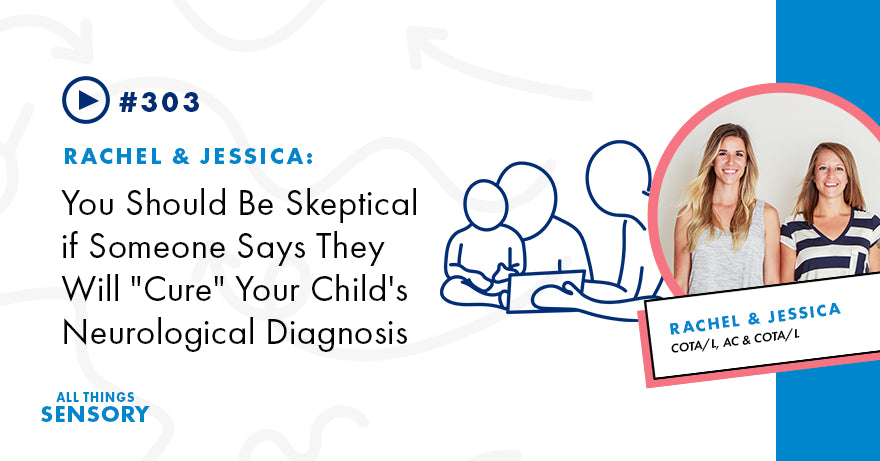Your Cart is Empty

We received a message in IG asking about Brain Balance and how their company claims to “cure” ADHD.
We thought this was interesting, so we wanted to talk about it!
There are many things that we don’t say we’re “curing” because it’s not something like a cold, or a broken bone.
Often the challenges or diagnoses we work with are biological or neurological and lifelong. There aren’t ‘cures.'
When a person or company tells a parent they’re going to ‘cure’ certain things, that should cause skepticism, especially in our line of work!
As occupational therapy assistants, our goal is to help our clients live their life as fully and as independently as possible. We provide modifications or adaptations to their current lifestyle and work on underlying skills to help improve their daily functioning.
Tune in for the full conversation!
All Things Sensory Podcast Instagram
Harkla Website - Shop Sensory Products!
Upon receiving an inquiry via Instagram from a parent regarding Brain Balance—an organization claiming to cure ADHD—we felt compelled to raise awareness. Their marketing strategy appears to promote their program heavily; however, the assertion that they can cure ADHD seems misleading and lacks substantiation.
If a parent notices that their child shows no signs of ADHD after integrating primitive reflexes, it's important not to claim that the ADHD has been "cured." The term "cure" should be used cautiously, reserved only for situations of definitive resolution.
Rather than pursuing cures for conditions like ADHD, we aim to equip children with critical tools to enhance their day-to-day experiences. Conditions rooted in biology or neurology don’t lend themselves to “cures” in the traditional sense, yet their influence on someone’s life can change and improve over time.
Parents and caregivers should maintain a healthy level of skepticism toward alleged cures. If a professional or company claims they can cure a condition, it's a significant warning sign that should prompt a critical evaluation of the claim's foundation.
People with ADHD frequently exhibit remarkable abilities in specific domains, even though they encounter significant hurdles in other aspects. They must leverage these talents while pursuing external assistance for areas of difficulty, especially as they navigate adulthood.
As adults and professionals, it's crucial to capitalize on our strengths, and we should equally encourage our children to identify and harness their unique talents. This doesn't mean we should overlook our weaknesses; recognizing and valuing our unique traits can bring significant advantages.
Even without innate organizational skills, our creativity can thrive, and that’s completely acceptable. Excelling in every area isn’t essential. While exploring various interests is beneficial, aiming for perfection in each one isn’t necessary.
It's vital to exercise critical thinking and delve deeply into inquiries rather than unquestioningly accepting someone's claims based on their higher education or expertise in a specific area. Possessing a degree or title does not guarantee the possession of absolute truths.
While these professionals can provide invaluable insights and assistance, claims of cures should be met with caution and thoughtful consideration. As occupational therapists, we don't claim to cure ADHD—instead, our approach is grounded in realism, support, and understanding of the unique challenges ADHD presents.
An OT focuses on identifying your child's individual challenges and strengths and developing tailored strategies for both you and your child to skillfully overcome these obstacles. Instead of promising a cure or a quick fix, our methodology is grounded in a deep comprehension of brain function and provides clear guidance for the most effective path forward.
As your child transitions into young adulthood, the presentation of ADHD changes yet again. Our responsibility as Occupational Therapists (OTs) and Occupational Therapy Assistants (OTAs) includes enlightening our clients and their families regarding these neurological or biological conditions.
Our dedication to empowering individuals with ADHD and their families goes far beyond providing strategies for daily living. We are committed to creating a nurturing community where members can connect, share their experiences, and find comfort in realizing they are not alone on this journey.
BORING, BUT NECESSARY LEGAL DISCLAIMERS
While we make every effort to share correct information, we are still learning. We will double check all of our facts but realize that medicine is a constantly changing science and art. One doctor / therapist may have a different way of doing things from another. We are simply presenting our views and opinions on how to address common sensory challenges, health related difficulties and what we have found to be beneficial that will be as evidenced based as possible. By listening to this podcast, you agree not to use this podcast as medical advice to treat any medical condition in either yourself or your children. Consult your child’s pediatrician/ therapist for any medical issues that he or she may be having. This entire disclaimer also applies to any guests or contributors to the podcast. Under no circumstances shall Rachel Harrington, Harkla, Jessica Hill, or any guests or contributors to the podcast, as well as any employees, associates, or affiliates of Harkla, be responsible for damages arising from use of the podcast.
Keep in mind that we may receive commissions when you click our links and make purchases. However, this does not impact our reviews and comparisons. We try our best to keep things fair and balanced, in order to help you make the best choice for you.
This podcast should not be used in any legal capacity whatsoever, including but not limited to establishing “standard of care” in a legal sense or as a basis for expert witness testimony. No guarantee is given regarding the accuracy of any statements or opinions made on the podcast.
Comments will be approved before showing up.